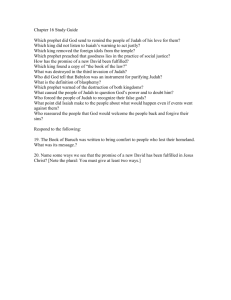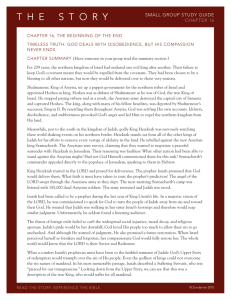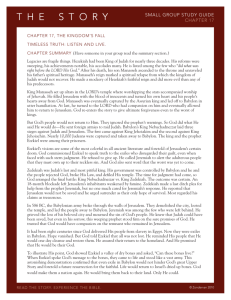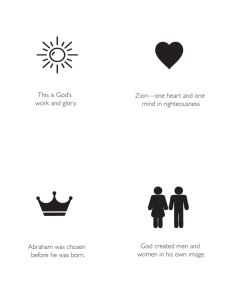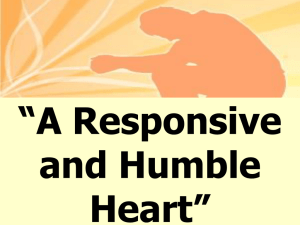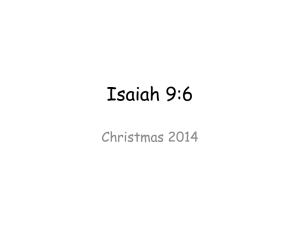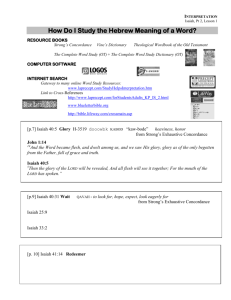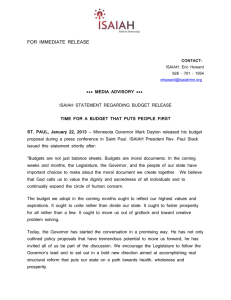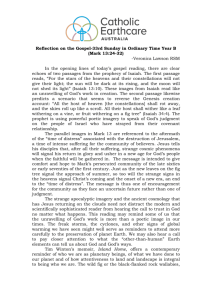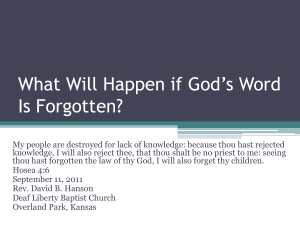Chapter 13: Conquest and Exile
advertisement
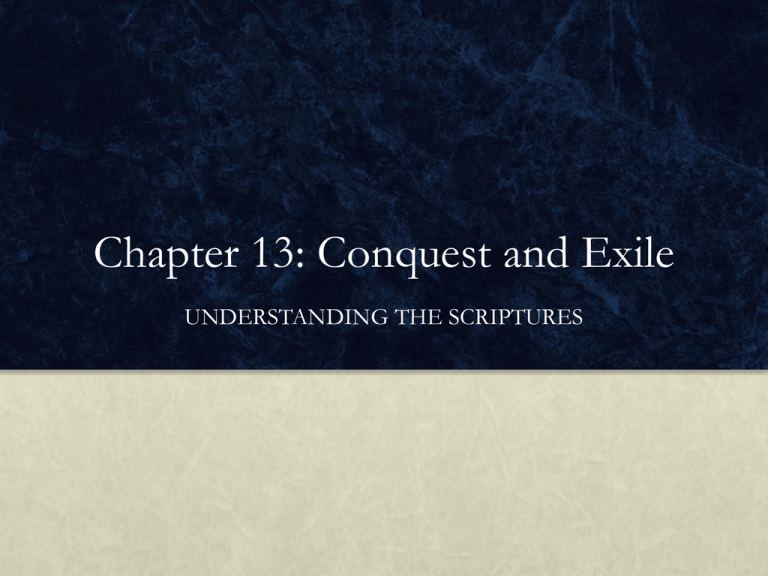
Chapter 13: Conquest and Exile UNDERSTANDING THE SCRIPTURES 1. Isaiah and Manasseh (pp. 240–245) ANTICIPATORY SET Write for two minutes, framing a definition of what a prophet is and does. Share responses. Today we will be studying one of the greatest prophets, Isaiah. 1. Isaiah and Manasseh (pp. 240–245) BASIC QUESTIONS What was Isaiah’s basic message? Who was Manasseh? KEY IDEAS Isaiah warned of disaster unless Judah would repent; nevertheless, he foresaw the return of a faithful remnant to Jerusalem and foretold of a Messiah from the house of David, born of a virgin, and coming from Galilee. Manasseh was an idolatrous king who was captured by the Assyrians, underwent a conversion, and returned to rule Judah well. 1. Isaiah and Manasseh (pp. 240–245) FOCUS QUESTIONS What was the fate of the leading citizens of Israel? The leading citizens of Israel were deported by the Assyrians. What was the fate of the poor farmers of Israel? Some of the poor farmers were left on the land. What was the fate of the population of Zebulun and Naphtali? The people of Zebulun and Naphtali, who had been conquered earlier, remained in Galilee. 1. Isaiah and Manasseh (pp. 240–245) FOCUS QUESTIONS What happened to the tribal structure of the ten northern tribes of Israel? It was destroyed. Who were the Samaritans? They were foreign peoples, also conquered by the Assyrians, who were resettled in the cities of central Israel that had been vacated by the exiled Jews. They intermarried with the few remaining Jews and began to worship the God of Israel. Having settled around the city of Samaria, they were called Samaritans. 1. Isaiah and Manasseh (pp. 240–245) FOCUS QUESTIONS What remained of the Davidic Kingdom after the fall of Israel? The Tribe of Judah, the little Tribe of Benjamin, and some Levites remained. Who led a temporary rebirth of the faith in Judah, and who was his guide? King Hezekiah was guided by the prophet Isaiah, son of Amoz. What were some of Hezekiah’s reforms? He eradicated all signs of idolatry in Judah, including pagan altars, sacred poles, and high places. 1. Isaiah and Manasseh (pp. 240–245) GUIDED EXERCISE A think / pair / share: State in your own words the promise and the curse of Isaiah 1:18–20. GUIDED EXERCISE A paragraph shrink on Isaiah 2:2–3. 1. Isaiah and Manasseh (pp. 240–245) FOCUS QUESTIONS What is the predominant theory concerning the authorship of Isaiah? Many scholars think Isaiah is a compilation of three or more prophets—the first part by Isaiah himself—put together by an editor who was in exile. What are the main themes of the Book of Isaiah? The main themes are the need to repent, the judgment to follow if the nation does not repent, and the endurance of the Davidic Covenant through a faithful remnant. Who comprised the remnant? The remnant was a small group of Jews who remained faithful to God. They returned to the Promised Land to establish a new kingdom in Jerusalem. 1. Isaiah and Manasseh (pp. 240–245) FOCUS QUESTIONS What is the stump of Jesse? This phrase refers to a descendant of Jesse, the father of David. Extension: The fulfillment of this prophecy is depicted artistically by a tree or vine, seemingly dead, from which new growth unexpectedly bursts forth (cf. p. 243). What virtues will the stump of Jesse possess? From God he will receive the spirit of wisdom, understanding, counsel, might, knowledge, and fear of the Lord. How was Galilee viewed during the time of Isaiah, and what did he predict would happen there? Galilee was populated by unimportant, backward, poor farmers, ignored even by the conquering Assyrians. Isaiah predicted a glorious thing would happen there: a boy would be born who would rule, and his name would indicate he is God: “Wonderful Counselor, Mighty God, Everlasting Father, Prince of Peace” (9:6). 1. Isaiah and Manasseh (pp. 240–245) FOCUS QUESTIONS Why was Isaiah’s prophecy about a great leader arising in Galilee a very unlikely one? The Galileans were poor farmers who did not generally produce great leaders. What was prophesied in Isaiah 7:10–16 (p. 244)? God would perform a miracle (sign): a young woman (virgin) would have a son, who will be named Immanuel (God is with us), and he would be the ideal ruler. Why did people expect the Messiah to be born of a virgin? The Hebrew word for virgin is also used in the Old Testament to mean young woman. The Septuagint—the Greek translation of the Old Testament by rabbis in Alexandria in the third century BC—translated Isaiah 7:14 using the Greek word for virgin; Greek uses a separate word for young woman. The choice of virgin demonstrates their understanding of this prophecy. Extension: This prophecy was fulfilled when Christ was conceived and born of the Blessed Virgin Mary, a young woman who had been before, was at the time, and ever remained a virgin; this is the doctrine of her Perpetual Virginity. 1. Isaiah and Manasseh (pp. 240–245) GUIDED EXERCISE A mini-lecture about translation. 1. Isaiah and Manasseh (pp. 240–245) FOCUS QUESTIONS What were Manasseh’s wicked deeds? King Manasseh reestablished paganism in Judah, defiled the Temple, and burned his own sons as pagan offerings. What befell Jerusalem as a result of Manasseh’s idolatry? The Assyrians sacked Jerusalem and carried him off into captivity. When did Manasseh convert to God, and what later deeds demonstrated this? While in captivity, Manasseh came to his senses and prayed to God. Manasseh was returned to Jerusalem where he abolished paganism and restored correct worship. He lived to reign longer than any other King of Israel or Judah. 1. Isaiah and Manasseh (pp. 240–245) CLOSURE Write a paragraph about a messianic prophecy from Isaiah that applies to Christ. 1. Isaiah and Manasseh (pp. 240–245) HOMEWORK ASSIGNMENT Study Questions 1–7 (p. 260) Practical Exercise 1 (p. 260) Workbook Questions 1–19 Read “The Great Reform” through “The Impossible Promise” (pp. 246– 251) 1. Isaiah and Manasseh (pp. 240–245) ALTERNATIVE ASSESSMENT Free write for five minutes, responding to the following question: Galilee was an unlikely origin for a savior. How does this reflect the way God usually works? 2. Josiah’s Reform (pp. 246–251) ANTICIPATORY SET What should a good man do if his wife were to leave him and their children, take lovers, become a prostitute, squander everything, and then sell herself into slavery? One of God’s prophets allowed this to happen to him. The Prophet Hosea’s relationship with his wife was a prophecy by example of God’s relationship with his Chosen People. God wanted the prophet to treat his wife like God was planning to treat Israel. 2. Josiah’s Reform (pp. 246–251) BASIC QUESTIONS Why was Josiah considered a good king? What made Jeremiah a great prophet? What did Jeremiah and Ezekiel prophesy? How did Hosea compare God’s relationship with Israel to the relationship between a husband and his unfaithful wife? KEY IDEAS Josiah converted Judah back to a correct relationship with God though he knew Judah’s fate was inevitable. Jeremiah stalwartly spoke for God, proclaiming Judah’s doom despite having suffered persecution for doing so. Jeremiah and Ezekiel prophesied God would preserve a remnant of the faithful who would return to Jerusalem; God promised the forgiveness of sins, a New Covenant written in the heart, and a righteous Davidic King. Hosea proclaimed God would redeem Israel, his bride, despite her unfaithfulness. 2. Josiah’s Reform (pp. 246–251) FOCUS QUESTIONS What were the fates of the sons of Josiah? They were carried away by more powerful kings. What did the Prophet Jeremiah endure for telling the truth? He was imprisoned, beaten by thugs, thrown down a well, and repeatedly threatened with death. Why did King Zedekiah visit the Prophet Jeremiah in secret? Jeremiah was unpopular with Zedekiah’s court prophets. The court prophets told the king what they thought he wanted to hear, namely, the scheme to rebel against Nebuchadnezzar would be successful. Zedekiah knew Jeremiah would be truthful. 2. Josiah’s Reform (pp. 246–251) FOCUS QUESTIONS For what is King Josiah best remembered? He was a great reformer who temporarily brought Judah back to the correct worship of God. What did the priests discover that had been lost and forgotten? They found a copy of the Book of Deuteronomy that had been hidden. What did Josiah conclude when he had heard the Book of Deuteronomy? The evils facing the people of Judah were a consequence of having disobeyed God. 2. Josiah’s Reform (pp. 246–251) FOCUS QUESTIONS What did the prophetess Huldah foretell for Judah and Josiah? Judah’s destruction was inevitable, but there would be peace in Josiah’s time. What did Josiah do to restore correct religious practice in Judah? He destroyed all the idolatrous holy places and expelled the cult prostitutes. Why did Josiah reform Judah despite the fact it would be destroyed? Josiah decided to do what was right even when there was no foreseen benefit. 2. Josiah’s Reform (pp. 246–251) FOCUS QUESTIONS According to Jeremiah, what would the inhabitants of Jerusalem do when besieged? They would eat their own children because of their terrible hunger. What did the earthen flask represent in Jeremiah’s demonstration? The clay flask, which Jeremiah broke in front of some of the elders and senior priests of Jerusalem, represented the people and city of Jerusalem, which God would break beyond repair. Why did Jeremiah use imagery from the creation narrative in the Book of Genesis? He wanted to communicate the destruction of Jerusalem would be like the undoing of creation: Jerusalem would be waste and void, no light would shine in the heavens, no men nor even birds would be seen, the fruitful land would become a desert, and the city would be in ruins. 2. Josiah’s Reform (pp. 246–251) FOCUS QUESTIONS How does the idea of a remnant apply to both the Flood and the fate of Judah? When God decided to destroy mankind, he saved Noah and his family. In the same way, God saved a remnant of faithful Jews to return after the Exile. According to Jeremiah and Ezekiel, how would the New Covenant compare to the Old? Moses had given the people a Law written on stone tablets, but they found it impossible to follow. Jeremiah foretold God would write a New Covenant on the hearts of his people; they would not have to be taught the Law, but each would know God personally. Ezekiel said God would remove his people’s heart of stone and give each person a heart of flesh; he would put his spirit within them so they could follow his laws. How did Ezekiel foresee the Sacrament of Baptism? God would sprinkle water upon his remnant in the age to come to cleanse them of their sins. Christians are cleansed of their sins through water. 2. Josiah’s Reform (pp. 246–251) GUIDED EXERCISE A think / pair / share to make a list of the characteristics of the new king according to Jeremiah. GUIDED EXERCISE Write a paragraph comparing the relationship between Hosea and his wife to that between God and the Israelites. 2. Josiah’s Reform (pp. 246–251) GRAPHIC ORGANIZER Complete the following table to organize the Kings of Judah. King Uzziah Jotham Ahaz Hezekiah Manasseh Amon Josiah Jehoahaz Jehoiakim Jehoiachin Zedekiah The Last Kings of Judah Brief Description 2. Josiah’s Reform (pp. 246–251) King Uzziah The Last Kings of Judah Brief Description A worshiper of the True God. Jotham Ahaz Worshiped the True God but allowed people to slip into idolatry. A wicked pagan king. Hezekiah A serious religious reformer. Manasseh A horrible pagan who was carried off by the Assyrians but who repented and returned to rule righteously. A pagan who was assassinated. Amon Josiah Jehoahaz A great reformer who found the s croll of the Law and restored true worship in Jerusalem. A pagan carried off by the Egyptians. Jehoiakim A pagan Nebuchadnezzar carried off to Babylon. Jehoiachin Jehoiakim’s eight-year-old son who reigned for three months before he was brought to Babylon. Josiah’s son and the last king. Nebuchadnezzar destroyed Judah because of Zedekiah’s scheme with Egypt. Zedekiah 2. Josiah’s Reform (pp. 246–251) CLOSURE Free write about how the New Covenant, foreseen by Jeremiah and Ezekiel, promised a change in people’s hearts. 2. Josiah’s Reform (pp. 246–251) HOMEWORK ASSIGNMENT Study Questions 8–11 (p. 260) Workbook Questions 20–32 Read “The Exodus Reversed” through “Daniel: Heroic Stories of the Exile” (pp. 252–257) 2. Josiah’s Reform (pp. 246–251) ALTERNATIVE ASSESSMENT Use the Graphic Organizer on page 251 to write a well-organized paragraph about the last Kings of Judah, devoting no more than one sentence to each king. 3. Reverse of the Exodus (pp. 252–257) ANTICIPATORY SET A paragraph shrink on the paragraph “When the destruction finally...” (p. 252). Share results. 3. Reverse of the Exodus (pp. 252–257) BASIC QUESTIONS What was the fate of Jerusalem and Judah under Nebuchadnezzar? How did the Jews react to life in a pagan city? What was the effect of the Babylonian Exile on the formation of Scripture? How did the Book of Daniel reflect the growing fidelity of exiled Jews? KEY IDEAS Nebuchadnezzar destroyed Jerusalem and Judah, deporting the leading citizens to Babylon; a remnant went into exile in Egypt in a reverse of the Exodus. Living in immoral, pagan Babylon and deprived of everything, the Jews rediscovered their God and heritage. Many books of the Old Testament were edited into their final forms during the Babylonian Exile. The Book of Daniel recounts heroic stories of faithful Jews who kept their distinct identity. 3. Reverse of the Exodus (pp. 252–257) GUIDED EXERCISE A think / pair / share on Deuteronomy 28:58–68. Make a list of prophecies that were fulfilled by the Babylonian conquest. 3. Reverse of the Exodus (pp. 252–257) FOCUS QUESTIONS What did Nebuchadnezzar do to Jerusalem when he had conquered it? He burned the most important buildings, including the Temple, and deported most of the important citizens to Babylon, leaving a governor behind to supervise those left. According to the Second Book of Maccabees, what was the fate of the Ark of the Covenant? Jeremiah sealed it in a cave on Sinai in a place unknown “until God gathers his people together again and shows his mercy” (2:7). What did the remaining inhabitants of Judah do that had been foretold in the Book of Deuteronomy? They went into voluntary exile in Egypt (cf. 28:68). 3. Reverse of the Exodus (pp. 252–257) FOCUS QUESTIONS What contrast existed between Jerusalem and Babylon at the time of the deportation? Jerusalem was in ruins, whereas Babylon was huge, rich, the center of an international empire, and full of vice. What good was God able to bring out of the Babylonian Exile? Deprived of everything they owned, the inhabitants of Judah remembered their God and recommitted themselves to their identity as the Chosen People. How does the history of Israel contradict the aphorism, “History is written by the victors”? In Babylon, the defeated Jews wrote their own history. In addition, many of the books of the Old Testament were edited into their final forms during this time. 3. Reverse of the Exodus (pp. 252–257) GUIDED EXERCISE A focused reading of Psalm 137:1–6 using the following question: What bitter irony is at the center of Psalm 137? 3. Reverse of the Exodus (pp. 252–257) FOCUS QUESTIONS What three stories about the Jewish faith are recounted in the Book of Daniel? The young men who would not eat pagan food flourished; Daniel had the ability to tell Nebuchadnezzar his dream and its meaning; and three companions of Daniel were cast into a fiery furnace but lived. What effect did Daniel’s heroic stories have on their readers? They helped the Jews remain faithful to God during the Exile amidst a pagan world. According to the Catechism, no. 710, why is the Exile not a failure of God’s promises? God was the Jews’ Savior by his faithfulness to the Mosaic Covenant. The Jews were experiencing purification through suffering, which was the beginning of their restoration. 3. Reverse of the Exodus (pp. 252–257) CLOSURE Write a paragraph about one of the following Basic Questions of this lesson: What was the fate of Jerusalem and Judah under Nebuchadnezzar? How did the Jews react to life in a pagan city? How did the Book of Daniel reflect the growing fidelity of exiled Jews? 3. Reverse of the Exodus (pp. 252–257) HOMEWORK ASSIGNMENT Study Questions 12–14 (p. 260) Practical Exercises 2–3 (p. 260) Workbook Questions 33–40 3. Reverse of the Exodus (pp. 252–257) ALTERNATIVE ASSESSMENT In your assigned group of three or four students, respond to Practical Exercise 2 (p. 260) about Nebuchadnezzar’s dream. The End
